Since its poor showing in the 2014 local elections, the Chinese Nationalist Party (KMT) has become a byword for failure and a subject of mockery — but now, party members are counting on a new asset to help them improve public perception: a hoodie bearing the party’s name.
Droves of disappointed supporters abandoned the KMT after the party’s 2014 post-election calls for reform and solidarity turned out to be empty slogans, while others decided to hide their support for the party to avoid ridicule.
Nearly 800 party employees have been laid off since late 2016, as the KMT had to trim its personnel expenses of NT$1.4 billion (US$47.7 million) per year to survive while it was denied access to most of its assets, many of which have been frozen pending investigation by the Cabinet’s Ill-gotten Party Assets Settlement Committee.
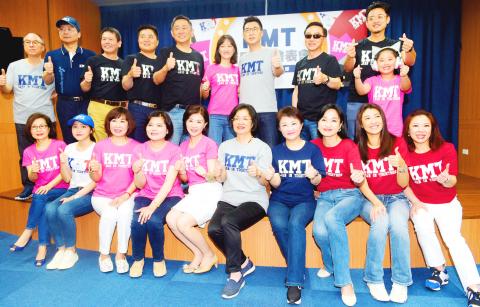
Photo: Chang Chia-ming, Taipei Times
However, just when everyone thought the KMT would continue on its downward path, a hoodie introduced by the KMT Women’s Department in January to raise funds for its volunteer program has unexpectedly helped revamp the party’s image and draw supporters.
“When I took over the leadership of the Women’s Department without pay in October last year, the party had lost most of its assets,” said KMT Legislator Ko Chih-en (柯志恩), whose department only has one other staff member left after it was downsized from almost 50 employees. “The department did not even have the budget to buy something as small as beverages for our volunteers.”
The idea of introducing a KMT hoodie came to Ko while she was mulling ways to generate new income, she said adding that she remembered the school hoodies of Tamkang University, where she served as student affairs dean for seven-and-a-half years before being elected lawmaker in 2016.
Hoodies printed with university’s acronym were popular with students because of their good quality and youthful design, she said.
“People used to think of the KMT as lame and filled with old folks,” Ko said. “Many of them would have been deterred by the idea of walking on the street wearing a shirt that bears the party’s logo.”
“However, I was certain that as long as our products radiated a young image, people would be willing to put them on,” she said.
When Ko’s hoodie — which comes in red and navy blue, and carries a large, bold KMT logo with the slogan “Lean in together” — was launched on Jan. 12, it did not immediately command the public’s attention.
However, after former president Ma Ying-jeou (馬英九) wore the hoodie on a grocery shopping trip on Lunar New Year’s Eve on Feb. 14, eager shoppers flocked to the Internet looking to buy one.
The hoodies remained out of stock until early March and several sellers on China’s popular Taobao.com even started selling knockoffs.
Several thousands of hoodies were ordered following Ma’s public appearance, Ko said, adding that people are increasingly buying the items in bulk.
The buying frenzy stands contrasts with the atmosphere in the run-up to the 2014 local and 2016 general elections, when Ma’s support ratings dropped to as low as 9.2 percent at one point. Ma was blamed for the KMT’s poor performance in the two elections.
So why has Ma gained popularity all of a sudden?
The DPP administration’s failure to live up to voters’ expectations could be a factor, Ma’s office spokeswoman Hsu Chiao-hsin (徐巧芯) said.
“After the DPP administration took office, many KMT supporters who did not vote in the two elections [out of disappointment] started to realize that in comparison Ma did a good job as president, especially in terms of stabilizing cross-strait relations and expanding the nation’s international space,” Hsu said.
Hsu said that since he left office in 2016, Ma has either won or been acquitted in most lawsuits brought against him, which speaks of his character and integrity, and has gradually restored people’s trust in him.
“The two sentiments combined are probably what has motivated KMT supporters to let their renewed support for the party be seen and heard, something they would not previously have done,” she said.
The hoodie’s popularity is evidence that people no longer feel embarrassed displaying or admitting their support for the party, KMT Legislator Johnny Chiang (江啟臣) said.
The introduction of the hoodie embodies the kind of KMT revival that pan-blue camp supporters have wished to see for a long time, Chiang said.
“The product stands out from the party’s longstanding serious and prudent culture, and paints a new image of openness, proactivity, flexibility and vitality,” Chiang said. “It represents some sort of cultural evolution and renovation.”
However, a hoodie alone will not salvage the KMT, which is why the party should take the opportunity to get rid of old ballast and revamp its culture, he added.
The KMT’s morale and public support will be put to the test in the Nov. 24 nine-in-one local elections — and so will Ko’s clothing business.
Ko on Tuesday launched a new line of T-shirts with KMT logo, which come in five different colors that she said were chosen based on a poll among young people.
“The only color that is off-limits is green,” Ko said, adding that she is also considering introducing a few designs where the KMT logo is less apparent, for the party’s younger and more reserved supporters.
Ko said the long-term goal is to expand beyond just clothes.
“I think my department will soon be able to afford lunch boxes for our volunteers,” she said.
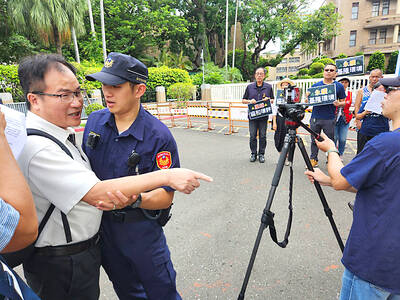
Environmental groups yesterday filed an appeal with the Executive Yuan, seeking to revoke the environmental impact assessment (EIA) conditionally approved in February for the Hsieh-ho Power Plant’s planned fourth liquefied natural gas (LNG) receiving station off the coast of Keelung. The appeal was filed jointly by the Protect Waimushan Seashore Action Group, the Wild at Heart Legal Defense Association and the Keelung City Taiwan Head Cultural Association, which together held a news conference outside the Executive Yuan in Taipei. Explaining the reasons for the appeal, Wang Hsing-chih (王醒之) of the Protect Waimushan Seashore Action Group said that the EIA failed to address
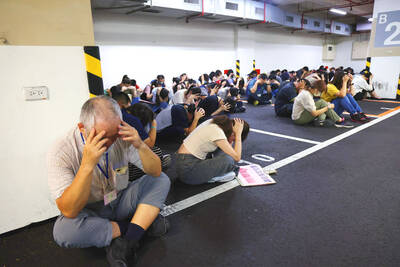
Taipei on Thursday held urban resilience air raid drills, with residents in one of the exercises’ three “key verification zones” reporting little to no difference compared with previous years, despite government pledges of stricter enforcement. Formerly known as the Wanan exercise, the air raid drills, which concluded yesterday, are now part of the “Urban Resilience Exercise,” which also incorporates the Minan disaster prevention and rescue exercise. In Taipei, the designated key verification zones — where the government said more stringent measures would be enforced — were Songshan (松山), Zhongshan (中山) and Zhongzheng (中正) districts. Air raid sirens sounded at 1:30pm, signaling the
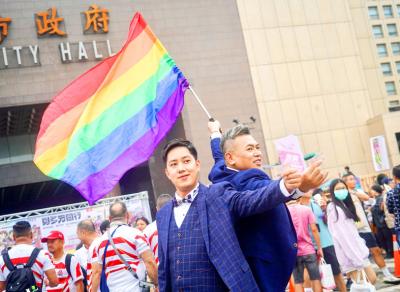
The number of people who reported a same-sex spouse on their income tax increased 1.5-fold from 2020 to 2023, while the overall proportion of taxpayers reporting a spouse decreased by 4.4 percent from 2014 to 2023, Ministry of Finance data showed yesterday. The number of people reporting a spouse on their income tax trended upward from 2014 to 2019, the Department of Statistics said. However, the number decreased in 2020 and 2021, likely due to a drop in marriages during the COVID-19 pandemic and the income of some households falling below the taxable threshold, it said. The number of spousal tax filings rebounded
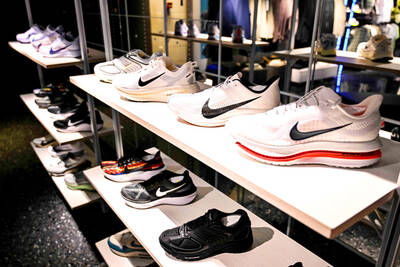
A saleswoman, surnamed Chen (陳), earlier this month was handed an 18-month prison term for embezzling more than 2,000 pairs of shoes while working at a department store in Tainan. The Tainan District Court convicted Chen of embezzlement in a ruling on July 7, sentencing her to prison for illegally profiting NT$7.32 million (US$248,929) at the expense of her employer. Chen was also given the opportunity to reach a financial settlement, but she declined. Chen was responsible for the sales counter of Nike shoes at Tainan’s Shinkong Mitsukoshi Zhongshan branch, where she had been employed since October 2019. She had previously worked